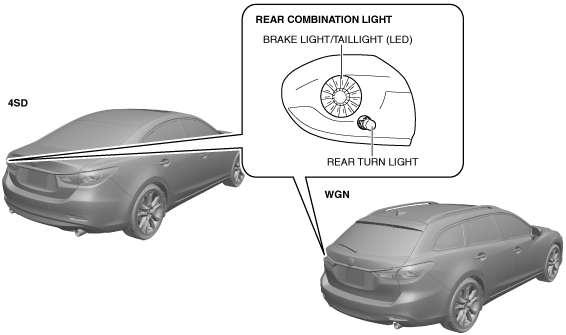REAR COMBINATION LIGHT
id091800011800
Purpose
• The rear combination lights are used to signal the following conditions to vehicles/people at the rear.
-
― Rear turn lights: Signals a left or right turn of the vehicle.
― Brake lights: Signals a vehicle stop.
― Taillights: Signals the presence of the vehicle to vehicles/people at the rear during nighttime.
Function
• The related light turns on or flashes according to the operation of each switch.
|
Operation switch
|
Related light
|
Operation condition
|
|
Light switch (TNS)
|
Taillight
|
Turns on
|
|
Brake switch
|
Brake light
|
Turns on
|
|
Turn switch
|
Rear turn light
|
Flashes
|
|
Hazard warning switch
|
Construction
• A type or B type is available for the rear combination light.
A type
-
• The rear combination light groups the rear turn light.
• The rear combination light is integrated with the Brake light/taillight (LED).
-
Note
-
• Fogging or condensation on the inside of the rear combination lights may occur, however, it is a natural phenomenon occurring as a result of a temperature difference between the interior and exterior of the combination lights and has no effect on the light performance. Fogging or condensation will dissipate when the temperature inside the rear combination lights rises after the rear turn lights are illuminated and a period of time has elapsed.
B type
-
• The rear combination light groups the rear turn light.
• The rear combination light is integrated with the following parts.
-
― Brake light (LED)
― Brake light/taillight (LED)
― Taillight (LED)
-
Note
-
• Fogging or condensation on the inside of the rear combination lights may occur, however, it is a natural phenomenon occurring as a result of a temperature difference between the interior and exterior of the combination lights and has no effect on the light performance. Fogging or condensation will dissipate when the temperature inside the rear combination lights rises after the rear turn lights are illuminated and a period of time has elapsed.
Operation
Taillights
1. When the light switch is operated to the TNS position, a light switch TNS signal is input to the start stop unit.
2. The start stop unit sends the light switch TNS signal to the front body control module (FBCM).
3. When the front body control module (FBCM) receives the light switch TNS signal, it turns the transistor inside the front body control module (FBCM) on.
4. When the transistor inside the front body control module (FBCM) turns on, the taillights are illuminated.
Brake lights
-
Operation due to brake pedal operation
Without smart brake support (SBS)
-
1. When the brake pedal is depressed, the brake switch (No.1 signal) turns on.
2. When the brake switch (No.1 signal) turns on, current flows from the battery to the brake lights.
3. The brake lights turn on.
With smart brake support (SBS)
-
1. When the brake pedal is depressed, the brake switch (No.1 signal) turns on.
2. When the brake switch (No.1 signal) turns on, a brake switch (No.1 signal) on signal is input to the brake light unit.
3. When the brake light unit receives a brake switch (No.1 signal) on signal, it supplies current to the brake lights.
4. The brake lights turn on.
Operation due to operation request signal from rear body control module (RBCM)
-
Note
-
Without smart brake support (SBS)/with smart city brake support (SCBS)
-
1. When the operation conditions are met, the rear body control module (RBCM) turns on the transistor inside the rear body control module (RBCM).
2. When the transistor inside the rear body control module (RBCM) turns on, the brake light relay turns on.
3. When the brake light relay turns on, current flows from the battery to the brake lights.
4. The brake lights turn on.
With smart brake support (SBS)
-
1. When the operation conditions are met, the rear body control module (RBCM) turns on the transistor inside the rear body control module (RBCM).
2. When the transistor inside the rear body control module (RBCM) turns on, the transistor inside the brake light unit turns on.
3. When the transistor inside the brake light unit turns on, current flows to the brake lights.
4. The brake lights turn on.
Rear turn lights (Turn light system)
1. When the turn switch is operated to the LH position, a turn switch LH signal is input to the start stop unit.
2. When the turn switch is operated to the RH position, a turn switch RH signal is input to the start stop unit.
3. The start stop unit sends the turn switch LH or RH signal to the front body control module (FBCM).
4. When the front body control module (FBCM) receives the turn switch LH signal, the rear turn light (LH) flashes.
5. When the front body control module (FBCM) receives the turn switch RH signal, the rear turn light (RH) flashes.
Rear turn lights (Hazard warning system)
1. When the hazard warning switch is turned on, a hazard warning signal is input to the start stop unit.
2. The start stop unit sends a hazard warning signal to the front body control module (FBCM).
3. When the front body control module (FBCM) receives the hazard warning signal, the rear turn light (LH) and (RH) flash.
Fail-safe
• Function not equipped.
